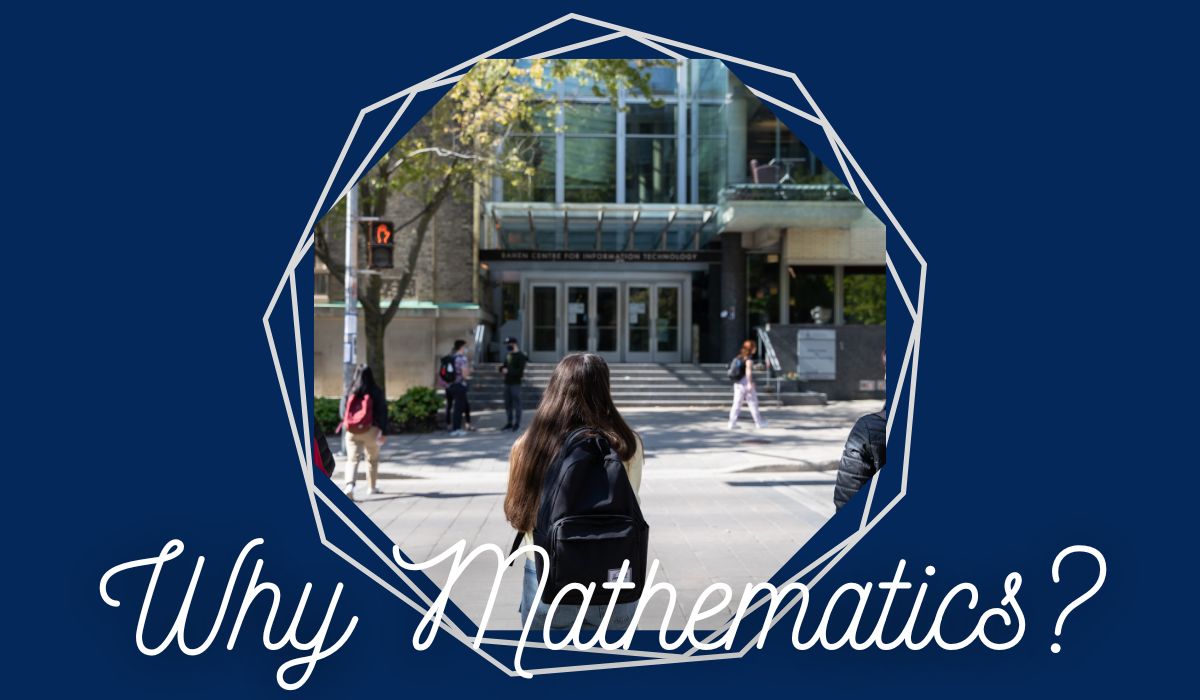The following is a guide for prospective students who are considering studying Mathematics at the University of Toronto.
Why Mathematics?
Mathematics is undergoing an explosive development both within the subject, and in interaction with a wide variety of other disciplines. It is used in physics, chemistry, biology, engineering, economics, finance, computer science, statistics, linguistics, and many other areas. There are more and more applications of increasingly sophisticated areas of mathematics.
Mathematics has its origins in the study of shape and number, and the desire to understand the physical world around us. Geometry, number theory, and mathematical physics continue to be important parts of mathematics, and many fundamental questions in these areas are still unresolved. However, with mathematics one can model biological systems, come to grips with chaotic dynamics and attempt to predict the behaviour of complex systems such as financial markets or even the weather.
What can I do with an undergraduate degree in mathematics? This is a question that often comes up when asked about the study of mathematics. A first-rate degree in mathematics prepares you for a career in many fields, including education, industry, commerce, finance, consulting, or in civil service. Increasingly, employers are appreciating that training in mathematics produces graduates who have strong analytical skills and a well-developed capacity for independent, high-level problem solving.
An undergraduate Specialist degree in Mathematics at the University of Toronto provides an excellent preparation for graduate work. Graduates from the University of Toronto are regularly accepted at the best graduate schools in Canada and the world — usually with full financial support. These programs also provide a strong background for graduate work in areas other in mathematics. Obtaining graduate degrees in mathematics may lead to employment in universities and increasingly, in business, finance, and consulting.
Why U of T?
The University of Toronto has the top mathematics department in Canada, and is the host of the Fields Institute, an international centre for research in mathematics. More than 20 members of the faculty are fellows of the Royal Society of Canada — the senior national body of distinguished Canadian scientists and scholars — more than any mathematics department in Canada.
The department offers students excellent opportunities to study the subject of mathematics and glimpse at current research frontiers. In addition, the University of Toronto also is one of the top research centres for other areas in the sciences such as computer science, economics, physics, and statistics. With the most programs of any university in Canada, a student may pursue a degree in almost any field of interest.
Programs & Courses
The Department of Mathematics offers a number of programs of study. The Specialist program in Mathematics and in Applied Mathematics are recommended to students who want a deep knowledge of the subject, such as those who are contemplating graduate work in mathematics, or mathematics and physics. The Specialist program in Mathematics and its Applications provides a broad basis for advanced careers in business, industry, government, and research. The program in Mathematics and Physics combines the two disciplines. Mathematics can also be combined with other fields of study, such as Actuarial Science, Computer Science, Economics, Philosophy, or Statistics. Specialist Programs lead to an honours BSc degree.
The Major program in Mathematics has goals similar to those of the Specialist programs, but is less intensive. On its own, the major program leads to a BSc degree; combined with a program from one or two other fields, it can also lead to an honours BSc degree. A minor program in Mathematics is also offered. This program would be of interest to students concentrating their studies in another area, who want to have a general knowledge of mathematics.
For more information on the programs and courses offered, please consult the Faculty of Arts & Science calendar.
What courses do I take in first year?
What to do in your first year depends on the mathematics program in which you are interested. For the Specialist program in Mathematics and in Applied Mathematics, you are required to enroll in Analysis I (MAT157Y) and Algebra I (MAT240H). For the Specialist program in Mathematics and its Applications, you should take Introduction to Computer Science (CSC148H), and either Introduction to Scientific, Symbolic and Graphical Computation (CSC260H) or Introduction to Modelling and Optimization (CSC270H); Effective Writing (ENG100H); Calculus! (MAT137Y) or Calculus I and II (MAT135H and MAT136H); Linear Algebra I (MAT223H), and An Introduction to Probability and Modeling (STA107H). For combined programs, you should take MAT137Y or MAT157Y and MAT223H or MAT240H as listed in the program requirements for the complementary program.
For the Mathematics Major, MAT135H and MAT136 or MAT137Y may be taken and MAT223H may also be taken in first year. For the Mathematics Minor, MAT135H and MAT136H or MAT137Y are suitable.



